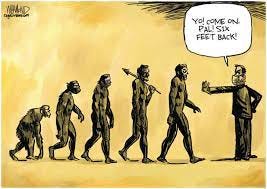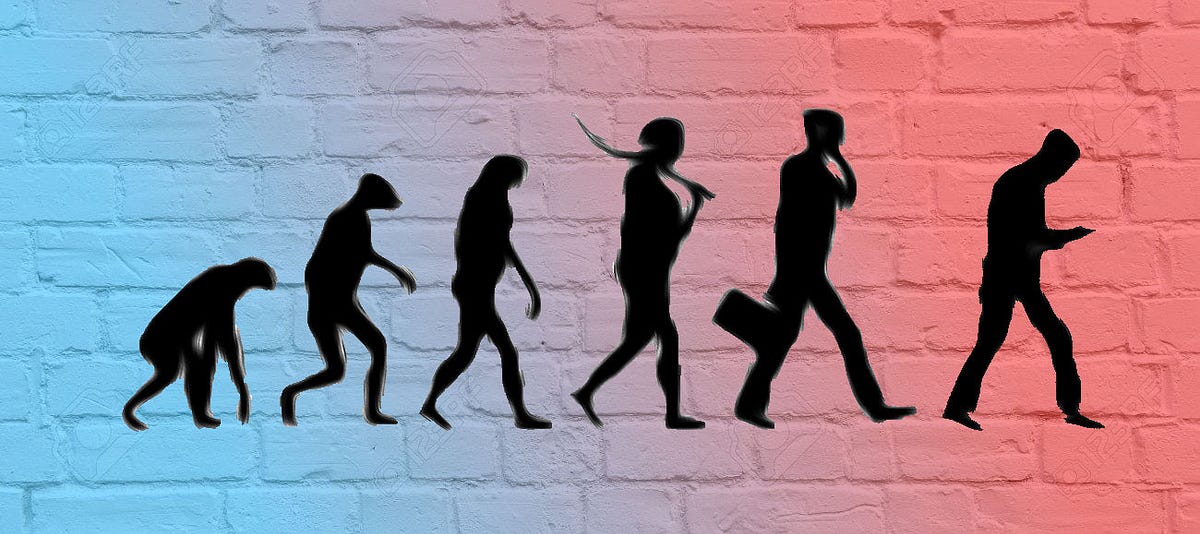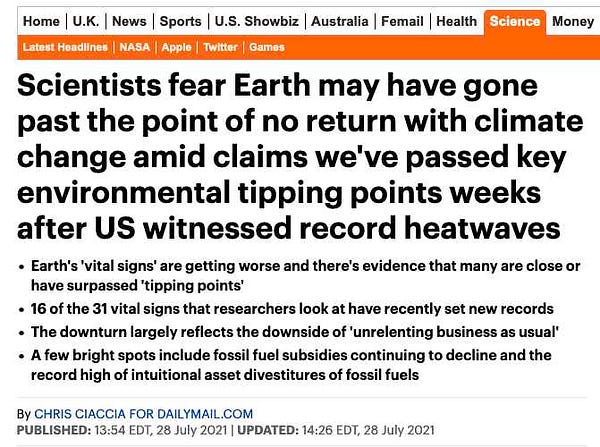The Great Pause Week 72: Homo Gestalt
"The popular meme of returning to the growth patterns of the past still holds sway."
“There are grave doubts at the hugeness of the land, and whether one government can comprehend the whole.”
— Henry Adams
As a young man doing solo hikes in the White Mountains of New Hampshire I learned a very important lesson, which may have saved my life more than once. If you lose the trail, don’t plunge ahead hoping to find it again. Retrace your steps until you are back on it.
I remembered that when I was lost in the back alleys of Medellin after midnight. I remembered in dense fog in the Great Smoky Mountains. I remembered it when, being out for a week north of Harpers Ferry during Hurricane Agnes, the rain had pounded my brain to mush, visibility was a blur, and the trail had become a river. I retraced and made it back.
What needs to be done now is very simple. Whether we will choose to do it soon enough to matter is more complicated. Social inertia binds us unnecessarily. We want to continue forward momentum. We don’t want to give up our hard-earned progress.
Ongoing natural disasters in the oldest cities of Netherlands, Belgium and Germany; a heat dome scorching the Pacific Northwest and British Columbia; snow in Brazil; unprecedented forest fires in the Western states and Russian Arctic, making their own weather and darkening distant cities; Antarctica melting away its glaciers; flooding in Maharashtra, Flagstaff and the Zhengzhou subway; ancient rivers running dry — these disasters come at us like a drone swarm, drawing our attention and compelling us to confront demons we have known about but decided to ignore. The closer to us the flames or the waves, the more difficult it is to claim ignorance. The excuses ring so hollow we can no longer bring ourselves to say them aloud.
“It’s not so much that #ClimateChange itself is proceeding faster than expected — the warming is right in line with model predictions from decades ago. Rather, it’s the fact that some of the impacts are greater than scientists predicted.”
— Michael E. Mann
We have known, indisputably since the Club of Rome report in 1972, that civilization was approaching limits to growth and would need to develop a contracting economic paradigm to preserve any gains for the future. Not having done so, many of those gains, and far more, are now being surrendered in very unpleasant ways. Our children are bankrupted before they are born.
There are many, perhaps still a majority, who believe that we will pass through this crisis and resume our trajectory towards the stars, our unique human capacity giving us the tools and technologies we will need to prevail, as we always have.
This is hubris. Geoff Lawton once said, ““We have expressions that say, in our language, ‘We are out of order.’ And we are. We are out of order. The orders of scale of size relevant within our design patterning.…”
We do not lack for ideas, technology or skills to reverse climate change. All those tools have been in our kit for centuries, gathering rust. But we are now well into the time of consequences, as the “natural” disasters in the news merely remind us.
 Many, and I include myself, believe that at this late date, the reckoning will be harsh and unforgiving. Humans will depopulate significantly, possibly even to extinction. If we are to survive as a breed, it will be only by radically altering our pattern of habitation of the natural world. We need to return to the ways of now extinct Homo habilis, the able man, and terminate our brief, foolhardy foray into Homo sapiens sapiens, the clever clever man.
Many, and I include myself, believe that at this late date, the reckoning will be harsh and unforgiving. Humans will depopulate significantly, possibly even to extinction. If we are to survive as a breed, it will be only by radically altering our pattern of habitation of the natural world. We need to return to the ways of now extinct Homo habilis, the able man, and terminate our brief, foolhardy foray into Homo sapiens sapiens, the clever clever man.There are many examples of indigenous peoples who practiced a steady-state economy over millennia that served all equally well, humans and non-humans alike. Those are successful models we can learn, recover, refashion, but it seems unlikely any large number of us would embark upon them. They are too alien to our popular culture, too heavy a lift.
The energy patterns expressed in the wild are finely tuned towards efficiency. There is no profligacy, because even the faintest amount of wasted effort can doom an individual, species or ecosystem. Contrast “clever” humans tossing energy around like it is infinitely expendable. Shoot some billionaires into space. Make million-dollar stainless-steel vacuum cleaners to serve as artificial trees and suck carbon dioxide from the sky — we can power them by solar cells made in clean rooms from aluminum, copper, silver and gallium, or from 100-meter-high, exotic-alloy, wind generators rotating magnetic cores of neodymium. Clever, but not wise. Powerful but fragile.Ecovillages, bioregionalism, forest peoples, lake edge peoples, nomads; governance devolved to watersheds; coordinated regenerative practices — these are antifragile memes. Plant trees and mangroves and let them grow. Grow fruit, nuts, alley crops, perennial root crops, bamboo shoots. Coppice and pollard for building materials, furniture, and small fuels. Make biochar and even draw electricity and wood gas from that drawdown process for your lights, refrigeration, air conditioning — modest devices that can be repaired by a blacksmith or tinsmith.
Take baby steps to get there by improving your own efficiency (use less energy, land, and other inputs and make less waste); transition to carbon drawdown alternatives for your most common activities; in every way shrink your own footprint; become responsible. Grow up.
In this genre-bending novel-among the first to have launched sci-fi into the arena of literature-one of the great…www.penguinrandomhouse.com
In his 1952–53 science fiction novel, More Than Human, Theodore Sturgeon imagined human evolution progressing in the 20th century to what he called Homo gestalt, created from several individuals with unusual mental abilities. It may be that within five years ubiquitous satellite internet with infinitesimal latency will enable homo gestalt with AI/AR/VR prosthetic devices to extend its fields of perception and computational power.
Alternatively, by biological succession, we can let our innate empathic qualities group us into telepathic clusters of parallel processors. The protagonists in More Than Human struggled to find who they are/were and whether they are meant to help humanity or destroy it. That should not be a question, but it has become one now.
The current pandemic may eventually turn out to be a culling of the herd — it is still too early to say and the popular meme of returning to the growth patterns of the past still holds sway — but as our bouts with 2021 weather events should make clear, there are more and greater calamities in the wings. The single biggest change we can make as humans is to stop acting like small warring tribes and go back to being family. We won’t survive by being clever. We need to be able.
___________________________
The COVID-19 pandemic has destroyed lives, livelihoods, and economies. But it has not slowed down climate change, which presents an existential threat to all life, humans included. The warnings could not be stronger: temperatures and fires are breaking records, greenhouse gas levels keep climbing, sea level is rising, and natural disasters are upsizing.
As the world confronts the pandemic and emerges into recovery, there is growing recognition that the recovery must be a pathway to a new carbon economy, one that goes beyond zero emissions and runs the industrial carbon cycle backwards — taking CO2 from the atmosphere and ocean, turning it into coal and oil, and burying it in the ground. The triple bottom line of this new economy is antifragility, regeneration, and resilience.
Help me get my blog posted every week. All Patreon donations and Blogger subscriptions are needed and welcomed. You are how we make this happen. Your contributions are being made to Global Village Institute, a tax-deductible 501(c)(3) charity. PowerUp! donors on Patreon get an autographed book off each first press run. Please help if you can.
#GenerationRestoration
“There are the good tipping points, the tipping points in public consciousness when it comes to addressing this crisis, and I think we are very close to that.”
— Climate Scientist Michael Mann, January 13, 2021.
Want to help make a difference while you shop in the Amazon app, at no extra cost to you? Simply follow the instructions below to select “Global Village Institute” as your charity and activate AmazonSmile in the app. They’ll donate a portion of your eligible purchases to us.
How it works:
1. Open the Amazon app on your phone
2. Select the main menu (=) & tap on “AmazonSmile” within Programs & Features
3. Select “Global Village Institute” as your charity
4. Follow the on-screen instructions to activate AmazonSmile in the mobile app.





Comments